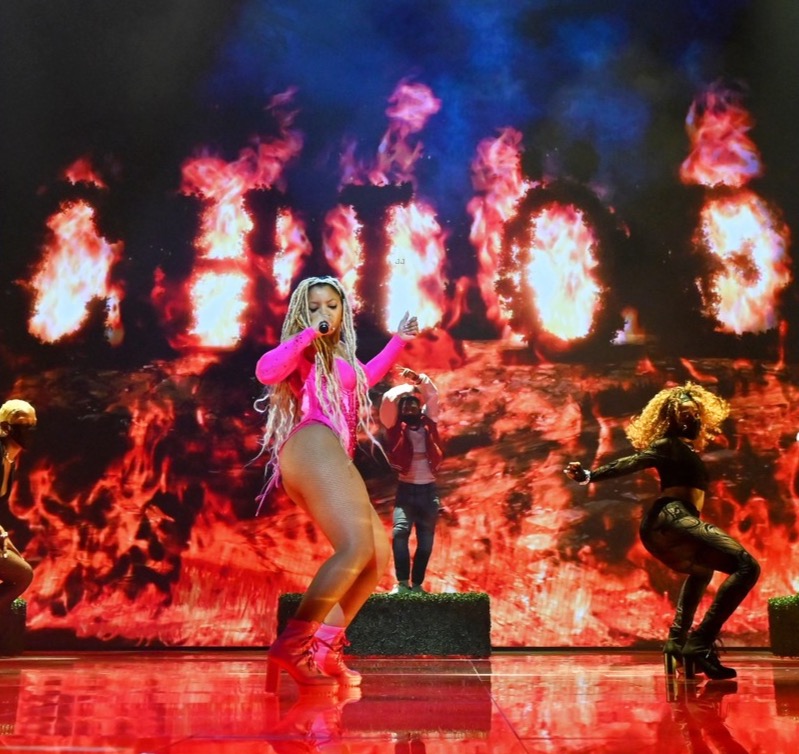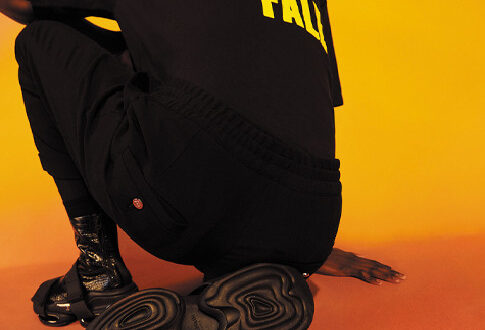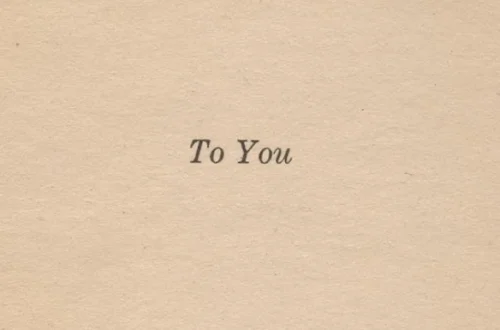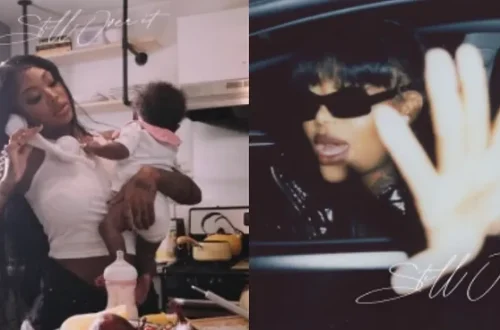
Chloe Bailey’s Sex Appeal as Power
The MTV Video Music Awards are an annual favorite of mine. The moment I realized I had missed the entire first half of the livestream, I haphazardly scrambled to find my TV provider information, momentarily shuffling aside my homework—which well into my senior year of college has become a common occurrence. Upon logging in, I happened to find myself at the very opening to Chloe Bailey’s solo debut performance for her new single “Have Mercy”.
As a passive listener to Chloe and her younger sister Halle’s music I was intrigued. I felt as if I’d witnessed the singing duo grow up before my very eyes. From getting noticed by their role model Beyonce in the early 2010s for their cover of her song “Pretty Hurts”, getting signed to the Queen B’s music label, and showing off their acting skills together on ABC’s Grown-ish, there was no doubt that these girls are taking over the entertainment world. And with any young creative comes the question: What’s next? How do you top what you’ve already done?
The answer—for both girls—seemed to come in the form of working on their own projects. Halle began filming for her role as Ariel in the new live-action remake of Disney’s The Little Mermaid and Chloe released her first hit single as a solo artist. With the song release came a frenzy of excitement, shock, and not least of all, criticism—most of which stemmed around Chloe’s body and sexual appeal.
The now 23-year-old singer-songwriter-producer—yes, give her the credit she deserves—has often spoken openly about her insecurities concerning the natural curves of her body. So, when she graced the stage at the 2021 Video Music Awards, adorn in a sparkly pink leotard accentuating her curvy figure and clearly flaunting her body while performing a song with lyrics that make reference to said body (the popularized chorus line being “Booty so big. I said, Lord, Have Mercy”) it should have come as no surprise to anyone that Chloe Bailey is no longer a child.
Her performance begins with Chloe in center-stage by herself draped in a pink, gauzy fabric—like a cloak of some sort—while shrouded in darkness, her voice filtering out into the space rising into a crescendo at which point green smoke pours out onto the stage, lightning strikes behind her, a chorus of screaming voices rings out, and the singer rips off the cloak in one grand gesture to reveal the bodysuit underneath. The audio track for “Have Mercy” begins, an image of a stone statue is projected behind her, and male dancers run out onto the stage at her beck and call.
Strutting across the stage, commanding the attention of all who watch her, Chloe seemed to say that she had journeyed down the rabbit hole of self-doubt and emerged into a new wonderland—or rather, stone garden—packed with body positivity and sexual agency. What says subverting the male gaze more than the Greek Gorgon herself, Medusa?
Medusa—as we all know—is often depicted as a she-monster with snakes for hair and cursed to live alone and isolated from the world, turning to stone any man who seeks her out. However, with every story, there are two sides. While some view Medusa’s powers as a threat and danger, Chloe’s embodiment suggests that the infamous gorgon is a character worth celebrating. As she dances on stage, shaking her body and hips to the rhythm of the music, the male dancers falling around her and timing their movements to match hers, she appears to be using her own sexuality as a weapon to wield over men. More Black female dancers—also clad in tight-fitting hot pink attire—enter the stage using their bodies in similar fashion.
Towards the end of the performance, Chloe drops to the stage floor while twerking, the words “BOOTY. SO. BIG.” flash behind her, and one can be quickly reminded of Megan Thee Stallion—another current popular music artist—who is known for her booty-popping, knee-squatting, curvaceous figure. Meg has received much criticism for being inappropriate, unladylike—read: ghetto—, and constantly spewing overzealous sex appeal, and following Chloe’s performance she received much of the same messages.
However, since Meg entered the mainstream music world, we have only ever known her as this very dominant sexual persona, while Chloe’s attempt at self-acceptance and body appreciation seems sudden to many who have only seen her perform vocally alongside her sister. This VMA performance left many critics and fans confused and wondering just where this sex appeal stems from—assuming of course that it sprang out of nowhere.
As Chloe’s role model, Beyonce—like the Goddess Athena who gave Medusa the power to turn men to stone as a way of protecting herself from men—is assumed to be rearing Chloe in her own image. Perhaps encouraging her to lean more into her sexuality and away from the youthful, pure image that people are so used to seeing Chloe in whenever she performs opposite her sister on stage. Chloe is accused of producing a watered-down copy of Beyonce’s style of music and performance, with many people suggesting that Chloe should have just stood there and showed off her vocals rather than shaking her butt.
The policing of Black femininity is not a new phenomenon. There is a long history of hyper-sexualization of and sexual control over the Black female body—stemming Jim Crow Era racial caricature such as the asexual Mammy, the seductive Jezebel, and so forth. Many took to social media to do just that (as anyone in this day and age with a host of Twitter fingers, the cloak of a computer screen, and an abundance of free time on their hands is wont to do), saying:
“it’d be better if she was singing about something with substance”
“Damn I guess she’s so in love with her ass”
It is easy to write Chloe off as seeking male driven attention since she is performing a song quite literally about her ass. However, many comments like those above fail to 1) look past her physical body for any other meaning that she provides through the performance, 2) view her as a complex artist who can both sing, dance, and embrace her femininity all at once, and 3) allow her room to grow outside of the confines of her duo with Halle.
Chloe responds to critics in stride, quoting a line from Beyonce’s “Formation” in which the famous singer affirms that it is quite possible for Black women to be complex, body positive, and co-existing in harmony:
“it’s alright ‘you know you dat bitch when you cause all dis conversation…’”
Chloe Bailey is coming into her Black femininity in a way that is just as unapologetic and captivating as the lick of the mic at the end of her performance—and accompanied by the same shock factor. It is strategic, grand, and done in a way that is not easily understood by all. As her single speaks for itself, “It’s on purpose, I’m doing it big. Body language, like speaking Spanglish. I’ll educate you how to do that shit.”


You May Also Like

Olivier Rousteing: Young, Fashionable, and Black
March 24, 2023
RE: A Letter to the White Gaze and Imagination
August 28, 2020
